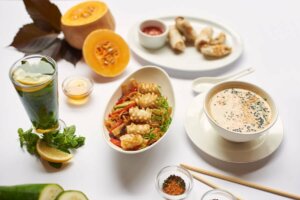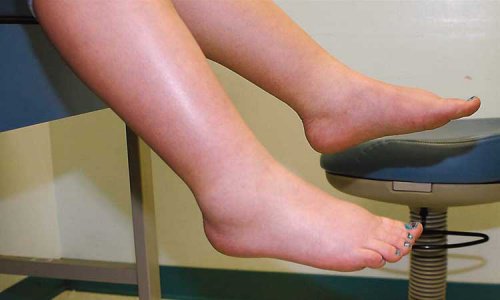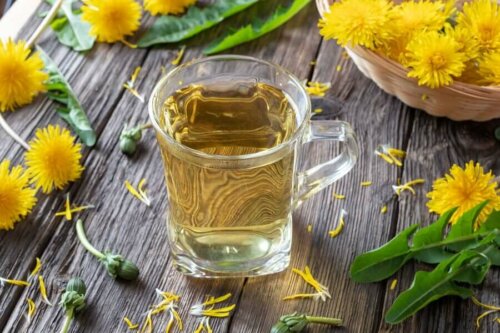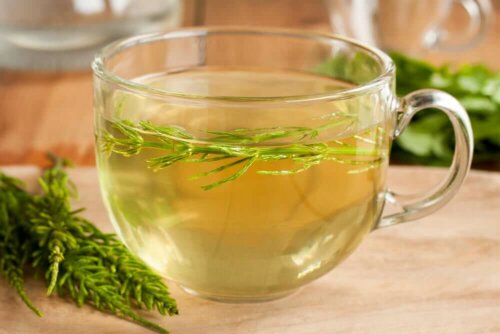Seven-Day Diet to Help Combat Fluid Retention

Patients who want to combat fluid retention should improve their eating habits. This is because diet has a huge impact on this problem. So, here’s a seven-day diet against fluid retention that can help.
A balanced diet, low in sodium, can contribute significantly to the relief of various discomforts, not just fluid retention. Thus, it’s important that you adopt and maintain it properly over time. Of course, always follow your doctor’s recommendations.
This seven-day fluid retention diet is a guide to improving your habits in order to relieve bloating and heaviness for the sake of your health.
What’s fluid retention?

However, it could also be pathological and if so, it might have something to do with cardiovascular, liver, or kidney problems. Similarly, it could also be due to overweight.
You can easily spot fluid retention with the naked eye. Also, when the person gains weight for no apparent reason and has swollen extremities or other parts of their body — such as the waist.
Seven-day diet, a proposal to improve habits
This diet against fluid retention can help you relieve certain discomforts, beginning with swelling. It includes several foods rich in water and fiber because these stimulate urination and contribute to well-being.
Note that you shouldn’t adopt this diet permanently, only occasionally to obtain relief. In addition, you must support yourself by adopting healthy lifestyle habits, such as doing a physical activity every day, for example.
General tips on how to combat fluid retention
Here are some general guidelines that’ll help you progressively improve your eating habits in a healthy manner.
- First of all, try to reduce your salt consumption, especially when cooking. or refined salt from your food. You can substitute it for aromatic herbs (basil, oregano, thyme, among others) and spices (cayenne pepper, curry, paprika). You can also use lemon juice and vinegar as a dressing instead of salt
- Keep the salt shaker away from the table when you eat in order to avoid adding more salt to your food than it already has
- Avoid processed food and snacks as these contain too much salt
- Stay away from refined sugar or sugary edibles, as these only make you crave more sweets. So, reserve the buns, treats, and other snacks in minimal quantities and for special occasions only
- Consult a nutritionist if you need a personalized diet
See also The incredible powers of gelatin
In the morning

During these seven days, you must start the day with a natural hydrating drink. A glass of natural juice without sugar, a mint infusion, a glass of water and lime, or a mixed shake, for example.
Ingredients
- A pear
- 1/2 cucumber
- 1 celery stalk
- A slice of fresh pineapple
- 1 pinch of fresh or ground ginger
- A c. of oat milk
- 1 tbsp of extra virgin coconut oil
Preparation
- Wash and cut the pear into small slices or cubes, you don’t have to peel them
- Cut the celery stick into small pieces
- Place the pear, celery, and oatmeal drink in the blender and process until smooth
- Then, add the fresh ginger and process it again
- Drink it right away, before or as part of your breakfast; you can also drink it mid-morning, as a snack
Breakfast can consist of a couple of whole-wheat toast with avocado and a boiled egg. Instead of adding salt to the avocado, add a touch of black pepper or just a little extra virgin olive oil.
Between meals, you can eat a handful of unprocessed nuts, without added salt or a piece of fruit if you’re still hungry.
At noon
As a first course, you may enjoy a gazpacho, a vegetable cream (zucchini, for example) or a salad. Then, as a second one: meat, egg, or fish with legumes and a garnish of pasta or brown rice.
As a dessert, eat whole fruits as these are rich in water. Opt for watermelon, melon, tangerines, pineapple, for example.
Mid-afternoon

If your doctor approves the consumption of some homemade infusions, such as horsetail, then you can drink a cup of this infusion in the middle of the afternoon, after having had a piece of fruit (an apple, for example) or yogurt with dried fruits (don’t add salt).
At night
It’s best to opt for light preparations at dinner time. You can eat soup, vegetable creams as the main course. As a second course, try a grilled chicken with vegetables, a French omelet with chard and garlic, or a low-salt fresh cheese sandwich with turkey and lettuce. Then, have a handful of nuts for dessert.
Good habits to combat fluid retention
Keep in mind that this is only a proposal for a diet against fluid retention and that you can expand and improve it as directed by your doctor or trusted nutritionist.
Also, remember you shouldn’t adopt it permanently and you shouldn’t go hungry or deprive yourself of your favorite meals. On the contrary, eat several times a day, but stick to wholesome food that contributes to your health and that helps you avoid edema.
All cited sources were thoroughly reviewed by our team to ensure their quality, reliability, currency, and validity. The bibliography of this article was considered reliable and of academic or scientific accuracy.
- Vallo, S., & Bartsch, G. (2014). Edema. In Urology at a Glance. https://doi.org/10.1007/978-3-642-54859-8_7
- Malhotra, S. K. (2012). Celery. In Handbook of Herbs and Spices: Second Edition. https://doi.org/10.1533/9780857095688.249
- Vasala, P. A. (2012). Ginger. In Handbook of Herbs and Spices: Second Edition. https://doi.org/10.1533/9780857095671.319
- Pinto, J., & Carbajal, Á. (2010). Dieta Equilibrada, Prudente o Saludable. Nutrición y Salud. https://doi.org/10.1177/0886260513479032
This text is provided for informational purposes only and does not replace consultation with a professional. If in doubt, consult your specialist.








